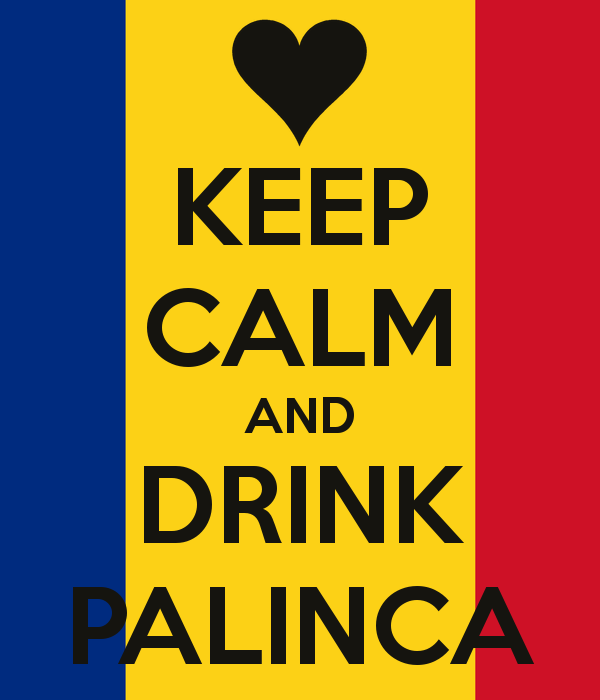The origins of pălincă and a little more...
 (Image source) The other evening, I was having dinner with friends and at some point, we got onto the subject of pălincă. As you do. When you're drinking it.
(Image source) The other evening, I was having dinner with friends and at some point, we got onto the subject of pălincă. As you do. When you're drinking it.
"Do you know the origin of pălincă?" Radu asked me. I thought I did in terms of the 'firey plum brandy claimed by the Hungarians as theirs which angers Romanians no end.'
"Nope," said Radu. "Pălincă comes from the word pelin, a plant - and the original drink was made from this."
Da? I didn't know. This calls for a blog, I thought, always a sucker for lesser-known facts. And so, a couple of hours ago (before I fell into a sleep induced by the heat here in Bucharest), I began goagaling. And goagaling... and goagaling. Pelin, says the can't-live-without-it Dex Online, is a horseradish leaf:
pălíncă f., pl. ĭ (poate d. pelincă, fiind-că se pune pe o frunză de hrean). Fc. Bulcă.
And this is where it gets REALLY interesting: according to my favourite online Romanian-English dictionary, the translation for pelin is wormwood ('Artemisia absinthium'), the active ingredient used to flavour - wait for it - Absinthe! When ground into a powder and used in small doses, it was an immensely popular treatment in the middle ages for all kinds of ailments including intestinal worms. Niiiice. In the Ancient world, it was strewn around the house to keep fleas and other unwanted beasties away. The Romans discovered that it promotes digestion by stimulating the gall-bladder and, when the leaf is chewed, it can calm nausea, vomiting and stomach cramps. Equally, when plague or cholera epidemics were rife in certain countries, houses were 'smoked' with dry wormwood since it is an excellent disinfectant. It is also efficient as a natural antibiotic. It should, however, be ingested in very, very small quantities otherwise it is a deadly poison.
The very thought that, once upon a time, pălincă could have been Central Europe's own ancient form of Absinthe is rather nice!!
Another ethymological suggestion: Could the name 'pălincă' have originated from the Romanian verb 'a păli' which means 'to hit over the head'? Considering the effect after a glass or three, I wouldn't be a bit surprised!
 (Photo source) Pălincă is no longer made from pelin, but from fruit - plums, to be precise. If any other fruit is used (apples, pears, apricots...), then the drink is known as rachiu. If you google 'pălincă', nothing comes up in connection with pelin unless you specifically search for those two words together. Instead, one reads almost everywhere that the origin is Hungarian, spelled 'pálinka' (even Dex gives this definition as higher priority than pelin), see HERE and HERE as examples.
(Photo source) Pălincă is no longer made from pelin, but from fruit - plums, to be precise. If any other fruit is used (apples, pears, apricots...), then the drink is known as rachiu. If you google 'pălincă', nothing comes up in connection with pelin unless you specifically search for those two words together. Instead, one reads almost everywhere that the origin is Hungarian, spelled 'pálinka' (even Dex gives this definition as higher priority than pelin), see HERE and HERE as examples.
Did you know that a battle took place between Hungary (which even has its own palinka festival) and Romania ending up in a diplomatic stew in 2002 for the right to use the name as a brand and thus, the rights to sell it? Had both countries thought a little more carefully, this could have been an excellent opportunity to develop a symbol of shared culture. But nope. Romania lost. Once a product is registered under a certain name with the EU, no other country can produce it under the same name without permission from the nation that first obtained the copyright and so that means, I guess, that you won't be seeing any bottles of it 'made in Romania' anytime soon...
THIS site explains what happened:
'The most interesting anecdote regarding Hungarian pálinka is connected to the EU negotiations in 2002, when the Hungarian and Romanian delegates were debating over the rights to use the brand name 'pálinka'. They were asked to present an argument which proves that the name originates from the language of the delegate's country, so the right to use the word could be justified. Avoiding the long debate, the delegate of the Hungarian Ministry of Foreign Affairs simply opened the Romanian Dictionary of Definitions and looked up the entry 'Palincă', where he found the following definition: 'Palincă is an alcoholic drink of Hungarian origin; it is made of fruits by fermentation and distillation'- This is how 'pálinka' became a genuine Hungaricum protected by the EU, and a brand name which can only be used by Hungary. Its manufacturing is regulated by The Pálinka Act which declares that pálinka can only be made of fruit or pomace grown in Hungary, the fruit content must be 100%, which means that no extra alcohol or other colouring, flavouring or sweetening agents are added, and the alcohol content is minimum 37.5%.'
 (Photo source) And so, it turns out that pălincă is not just a strong apéro, a celebratory tipple or a way to warm the cockles on a winter's day but also a political weapon used by one country against another. Both Romania and Hungary are proud of their pălincă and pálinka and it has been part of the two nations' traditions since times immemorial. A shame Orban had to be greedy...
(Photo source) And so, it turns out that pălincă is not just a strong apéro, a celebratory tipple or a way to warm the cockles on a winter's day but also a political weapon used by one country against another. Both Romania and Hungary are proud of their pălincă and pálinka and it has been part of the two nations' traditions since times immemorial. A shame Orban had to be greedy...
Frankly, as far as I am concerned, nothing beats the pălincă from Bistrița-Nasăud, and there's some wonderful stuff to be found around Bran, too. The best in Romania is said to be from Zalău, but I cannot comment as I've never had the pleasure.
So, voilà. Thank you, Radu, for the inspiration, and noroc!
![]()

/https%3A%2F%2Fstorage.canalblog.com%2F03%2F12%2F353913%2F41915630_o.jpg)
/https%3A%2F%2Fstorage.canalblog.com%2F15%2F06%2F353913%2F41915331_o.jpg)
/https%3A%2F%2Fstorage.canalblog.com%2F03%2F68%2F353913%2F41914713_o.jpg)
/https%3A%2F%2Fstorage.canalblog.com%2F22%2F12%2F353913%2F29890995_o.jpg)
/https%3A%2F%2Fstorage.canalblog.com%2F68%2F41%2F353913%2F29890862_o.jpg)


/https%3A%2F%2Fstorage.canalblog.com%2F08%2F12%2F353913%2F116988178_o.jpg)
/https%3A%2F%2Fstorage.canalblog.com%2F59%2F38%2F353913%2F115811794_o.jpg)
/https%3A%2F%2Fstorage.canalblog.com%2F00%2F54%2F353913%2F113969303_o.jpg)
/http%3A%2F%2Fp8.storage.canalblog.com%2F81%2F17%2F353913%2F59684501_p.jpg)